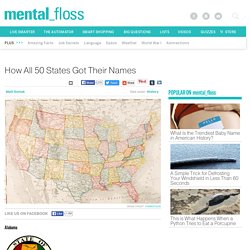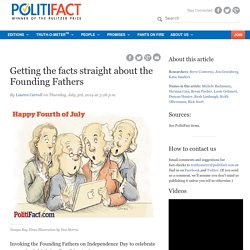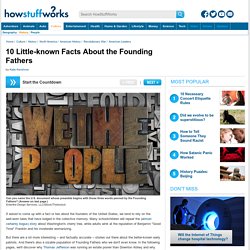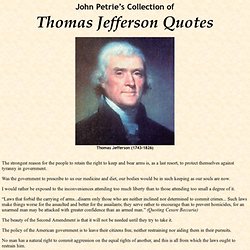

How All 50 States Got Their Names. Alabama Before Europeans landed on American shores, the upper stretches of the Alabama River in present-day Alabama used to be the home lands of a Native American tribe called – drum roll, please – the Alabama (Albaamaha in their own tribal language).

The river and the state both take their names from the tribe, that's clear enough, but the meaning of the name was another matter. Despite a wealth of recorded encounters with the tribe – Hernando de Soto was the first to make contact with them, followed by other Spanish, French and British explorers and settlers (who referred to the tribe, variously, as the Albama, Alebamon, Alibama, Alibamou, Alibamon, Alabamu, Allibamou, Alibamo and Alibamu) – there are no explanations of the name's meaning in the accounts of early explorers, so if the Europeans asked, they don't appear to have gotten an answer.
Getting the facts straight about the Founding Fathers. Invoking the Founding Fathers on Independence Day to celebrate our nation’s birth is a fine thing to do.

Invoking them to score political points? Watch out. Take, for example, a Facebook post about Benjamin Franklin that circulated in May, a post that was actually aimed at making fun of tea party favorite Rep. Michele Bachmann, R-Minn. The meme quotes Bachmann as saying, "This country could use a president like Benjamin Franklin again. " It’s not just claims on social media. Talking about the First Amendment, radio host Bryan Fischer of American Family Radio said that "by the word ‘religion’ in the First Amendment, the founders meant Christianity. " Our research and interviews with historians showed that the Founding Fathers pretty clearly meant all religion. 10 Little-known Facts About the Founding Fathers. That's right, our first little-known fact about the Founding Fathers is ... who the Founding Fathers are.

Indeed, most of us never had a primer about who to include in the group, because none of them self-identified as a Founding Father. (We'll get into the origin of the title later.) Commonly, we refer to our Founding Fathers as those who were present at the 1787 Constitutional Convention. Easy enough, right? Well, when you consider that Thomas Jefferson, John Adams, Samuel Adams and John Hancock all weren't present at the convention you might start to rethink the categories. Accordingly, we tend to include not just those at the Constitutional Convention but also those who signed the Declaration of Independence in 1776. So, in a way, you can include any revolutionary or activist you want in the mix, and we often do, by referring to Paul Revere or other early American patriots in the group. History of the United States of America - in Depth -
American History. Hopi. Hopi The Hopi are a Native America Nation who primarily live on the 1.5 million acre Hopi Reservation in northeaster Arizona. The reservation is surrounded by the Navajo reservation. Hopis call themselves Hopitu - 'The Peaceful People'. The name Hopi is the shortened form of the title to what they called themselves, "Hopituh Sinom", "the people of Hopi".
Hopi is a concept deeply rooted in the culture's religion, spirituality, and its view of morality and ethics. Hopis live in northeast Arizona at the southern end of the Black Mesa. Ancestry. Native American. John Petrie's Collection of Thomas Jefferson Quotes. Thomas Jefferson (1743-1826) The strongest reason for the people to retain the right to keep and bear arms is, as a last resort, to protect themselves against tyranny in government.

Was the government to prescribe to us our medicine and diet, our bodies would be in such keeping as our souls are now. I would rather be exposed to the inconveniences attending too much liberty than to those attending too small a degree of it. “Laws that forbid the carrying of arms...disarm only those who are neither inclined nor determined to commit crimes... Such laws make things worse for the assaulted and better for the assailants; they serve rather to encourage than to prevent homicides, for an unarmed man may be attacked with greater confidence than an armed man.”
The beauty of the Second Amendment is that it will not be needed until they try to take it. The policy of the American government is to leave their citizens free, neither restraining nor aiding them in their pursuits. Say nothing of my religion. American History.